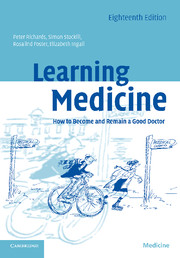Book contents
- Frontmatter
- Contents
- Foreword
- Preface
- 1 Why medicine and why not?
- 2 Opportunity and reality
- 3 Requirements for entry
- 4 Choosing a medical school
- 5 Application and selection
- 6 Interviews
- 7 Medical school: the early years
- 8 Medical school: the later years
- 9 Doubts
- 10 The new doctor
- 11 Developing your career
- 12 Career opportunities
- 13 Privileges and responsibilities: avoiding the pitfalls
- Postscript
- Appendices
- Index
6 - Interviews
Published online by Cambridge University Press: 02 December 2009
- Frontmatter
- Contents
- Foreword
- Preface
- 1 Why medicine and why not?
- 2 Opportunity and reality
- 3 Requirements for entry
- 4 Choosing a medical school
- 5 Application and selection
- 6 Interviews
- 7 Medical school: the early years
- 8 Medical school: the later years
- 9 Doubts
- 10 The new doctor
- 11 Developing your career
- 12 Career opportunities
- 13 Privileges and responsibilities: avoiding the pitfalls
- Postscript
- Appendices
- Index
Summary
Academics and careers advisers debate the usefulness and fairness of an interview in the process for selecting future medical students and doctors. Those on the receiving end – the candidates – are unanimous in the belief that the interview is somewhere between daunting and dreadful. Some of the dread is fear of the unknown, as well as fear of being judged on what is little more than first impressions. Read on, and you may have some of those fears dispelled and be able to give yourself a better chance at creating a positive impression.
On a dull overcast day due for an imminent downpour, you step off the early morning train in your best new outfit, shoes polished, hair neatly brushed, clutching a copy of a newspaper in which you have just been reading an article about trendy new treatments for anxiety. As you approach the gates of the medical school and see the sign directing “Interview Candidates This Way” you wish you could remember any of the useful tips from that newspaper article; as it is you are so nervous you are no longer sure you can even remember your own name. It is not your first interview for a place at medical school, you had one last week. Although most of the details are lost in a haze of pounding heartbeats and sweaty palms, you are unable to rid yourself of the image of that professor's face when you dug yourself into a hole discussing the nutritional requirements of the Twa pygmies, a subject in which the sum of your knowledge was gleaned from the last 5 minutes of a late night documentary on BBC2.
- Type
- Chapter
- Information
- Learning MedicineHow to Become and Remain a Good Doctor, pp. 76 - 82Publisher: Cambridge University PressPrint publication year: 2007

